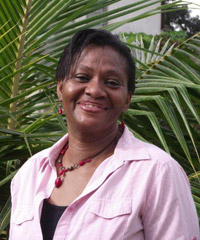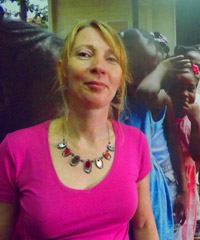All children are different; they develop and learn in different ways. When starting at school, they have different backgrounds and different starting contexts. They all want to grow and learn. This usually goes well, but sometimes extra support is needed. This may be short-term support - like a pat on the shoulder and a sincere compliment - or through offering care if more attention and guidance are needed. When we want to monitor and support ALL students, we offer them care on all levels. We call this care expansion: the idea is to offer all children equal opportunities in developing their abilities and talents. So in short, the aim is a challenging, positive qualitative education for all!
It is important to assign a care coordinator (CaCo), a specially trained teacher who, in close cooperation with the headmaster and the school staff, is responsible for optimally offering and coordinating care for students. This concept is new to most Surinamese primary schools.
Together with the school team, the CaCo develops ideas and approaches for care and works out a detailed school care plan. The CaCo works out clear procedures for observations and testing (pupil tracking system), keeps student files and organises student and class discussions. CaCos support the teachers, teaching them about dealing with differences between students and they organise care in the classroom. The CaCo can also offer guidance to students (individually or in a group), although where possible a Remedial Teacher is appointed to this aim.
Care coordination in Suriname
In 2008, the Counselling Department of the Ministry of Education and Community Development (MOECD) in Suriname started a project on strengthening student care at primary schools. From 2010 onwards, VVOB supported the project and facilitated an on-the-job training for CaCos through workshops, intervision and coaching. Out of the 334 primary schools in Suriname, 40 participated in the first phase.
To learn more about care coordination in Suriname, we interviewed Mrs. Yolanda Stella. She is a social worker at the Counselling Department (MOECD) as well as the CaCo project coordinator.

Mrs. Yolanda Stella,
Social worker at the Counselling Department and the CaCo project coordinator
How did it all start?
"It started at one school, where I worked as a social worker. If I had any questions concerning student care, the headmaster referred me to one of the teachers. This teacher kept a paper record of all children; containing all past conversations with the children and their parents, as well as how well the student was doing. How wonderful it would be to have such a person responsible for this kind of work in every school. In 2008, 30 CaCos started. Initially they only focused on children with behavioural problems, but later some started to support children with learning difficulties as well."
How did the headmasters react to this new function?
"Initially all headmasters were positive about it. As time passed by it became clear to them that care is a responsibility of everyone and that they should assist the CaCo. That’s when some became less enthusiastic. They didn’t yet have a clear notion of care. Today, some headmasters are still struggling with the tasks and the new role of this CaCo. That is why we actively involved the headmasters in the CaCo training."
How did VVOB support this project?

Tille van Horenbeeck,
Coordinator 'Ministerial Departments' within PROGRESS, VVOB Suriname
Tille van Horenbeeck is a Coordinator within PROGRESS, the education programme of VVOB Suriname. She explains: "Our aim is to further support the Counselling Department in its operations. The project on improving care at schools was their idea and we supported this strategy in a tailored way. It fitted well with our goal to contribute to more pupil-centred and child-friendly education. We brought in expertise at the right time, constantly keeping sustainability in mind. We worked on three levels: the policy, the Counselling Department and the schools."
About this sustainability...?
"Yes, we have to make sure that the training offered to the first group of CaCos is permanently anchored and can be applied in new schools. Also, this function needs official recognition; and there is need for a national policy on care at primary schools.
Furthermore, it is important to keep evaluating the schools - which is done by coaches: What is the position of the CaCo? Do the CaCo and the school make any progress? This is an important step that helps us define the continuation approach."
What happens at school?
"In search for the answer to that, we organised a storytelling session and we collected personal stories of participants during the trainings."
Some conclusions of a storytelling session
The CaCos indicated that their arrival at schools had a relatively quick impact on the school. "The students now have some kind of sounding board. Collaboration between teachers, parents, the headmaster and the students has been improved. Teachers are better supported in their educational and pedagogical processes. There is a change in the way of looking at children and education. And finally: the project has changed the participants themselves."
"Before the CaCo was introduced, children who needed care, were always left behind. Some teachers knew nothing about learning difficulties or were ignorant to the fact that not all children learn just as fast. Mostly, those children were snubbed. Now, with a CaCo in the school, such a teacher is taught the differences between children. They learn that they have to take it into account when a child is a slow learner. If a child doesn’t listen, it means there is a problem and you have to look for solutions together."
"The CaCo project made me another person. I have learnt how to better deal with my emotions and how to look at colleagues, pupils,… other people through different lenses. This training even enabled me to be a better parent to my own children."
"Children in need of care deserve equal opportunities."
A CaCo nicely summarised the comments: "CaCo is a CaCo for 24 hours a day. Not only to the children, but also to the parents and the teachers."
By Nico Vromant, Rosanda Courtar and Tille van Horenbeeck, VVOB Suriname
Translated by: Michiel De Mylle




